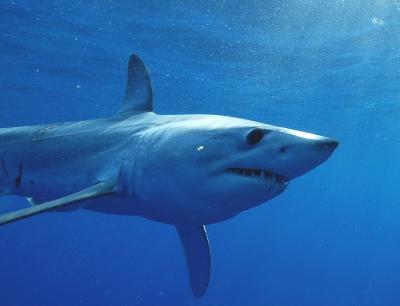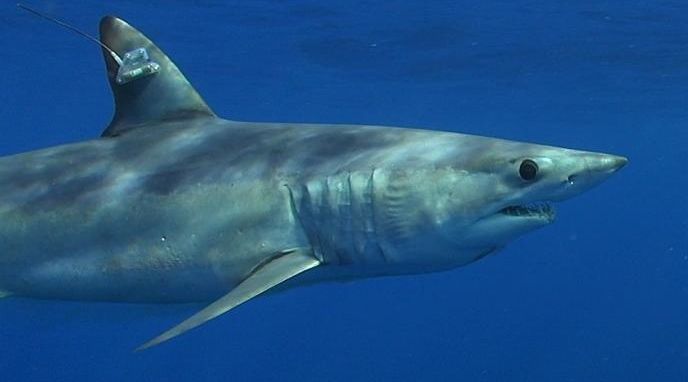Shortfin Mako Shark under Threat
The shortfin mako shark is disappearing 10 times faster than previously thought. How are researchers trying to change this process?
By Kate Stone
The shortfin mako shark is the fastest shark in the world. Its top cruising speed has been recorded at 40 kilometers per hour (kph), or 25 mph, with bursts of up to 74 kph, or 46 mph. Because shortfin makos are so fast, collecting accurate data about them has been especially difficult. Fortunately, new real-time satellite tracking technology has enabled researchers to gather much more accurate information about these amazing sharks. Unfortunately, the data is shockingly grim: shortfin mako sharks are being killed in fisheries at a rate 10 times greater than previously thought.
As apex predators, large sharks are essential to a healthy ecosystem. But sharks have been increasingly under threat, and shark populations have been decimated. In a new study revealing even more bad news for sharks, researchers from Nova Southeastern University’s Guy Harvey Research Institute (NSU’s GHRI), the University of Rhode Island, and other colleagues use satellite tracking data to investigate the fishing mortality rate of shortfin mako sharks. The data shows that the fishing mortality rate of the shortfin mako in the western North Atlantic is considerably higher than old estimates from catches reported by fishers. These findings suggest that this major ocean apex predator is experiencing overfishing, raising serious concerns about whether the current levels of fishery catches in the North Atlantic are sustainable.
The rise of better shark data
“Traditionally, the data obtained to determine the rate of fishing mortality, a key parameter used to help gauge the health of shark stocks, has depended largely on fishermen self-reporting any mako sharks they may have caught,” explains Mahmood Shivji, director of the NSU’s GHRI. “The challenge is that not all fishermen report the same way or some may underreport or even not report their mako shark captures at all, so that these catch data are known to be of questionable reliability.”
Shivji says that recent tracking of mako sharks using satellite tags has allowed researchers to bypass the dependency on self-reporting by fishers and obtain more reliable data.


“Using satellite tags for makos and possibly other fished species can be a time-efficient way and a fisheries-independent tool for gathering useful fisheries-interaction data, including answering fundamental questions about the levels of fishing survival and mortality,” says Michael Byrne, a postdoctoral fellow at NSU’s GHRI. “The tracking data also showed these mako sharks entered the management zones of 19 countries, underscoring how critical it is for countries to work together closely to manage and conserve these long-distance oceanic travelers.” When the researchers began to gather, compile, and review the data, the results were startling.
For this study, 40 shortfin mako sharks received satellite tags, and 30 percent of those tagged sharks were captured in fisheries. After modelling the probability of a mako shark surviving a year without being captured (a 72 percent chance) and calculating the fishing mortality rates, researchers determined that the rate at which shortfin makos were being killed in fisheries was actually 10 times higher than previously believed.
“From a conservation and protection point of view, this is huge,” says Bradley Wetherbee, a research scientist from the University of Rhode Island’s Department of Biological Sciences and a member of NSU’s GHRI. “It’s vital that we have the most accurate data possible to aid decision makers in managing marine life populations sustainably. If they have inaccurate information, it’s much more difficult to make the correct decisions for properly managing populations. Everyone wants the populations managed in a sustainable way.”
RELATED: TUNA STAY WARM WITH COLD HEARTS
Globally, many shark species have seen significant declines in their numbers, with overfishing cited as a major cause. This can happen in many ways; some shark species are specifically targeted, while others are captured by accident (called bycatch). No matter how sharks are taken, the data shows that the current rate at which sharks are being removed from the world’s oceans is unsustainable.
What is being done?
The researchers stress that the goal of their work is providing the most accurate information possible to those in positions to take action to manage mako and other shark species. They say that they want to create successful fisheries management and conservation plans to avoid declining populations—and to do that, we must have as much accurate data as possible.
“We have to have sustainable approaches to fishing,” Dr. Shivji says. “Sharks might get a bit of a bad rap in the media, but these apex predators are vital to the overall health of our oceans. You remove them from the equation and, quite honestly, we don’t know how far those ripples will be felt. One thing we do know is it won’t be inconsequential.”
This study has been published in the Journal Proceedings of the Royal Society B.
Featured image: A satellite-tagged mako shark. Photo by George Schellenger (GHOF).
References
Aidan Martin, R. Biology of the Shortfin Mako (Isurus oxyrinchus). (n.d.). ReefQuest Centre for Shark Research. (Accessed 2006, August 12).
The tracks of the tagged mako sharks, including the ones captured, can be viewed online on NSU’s GHRI shark tracking website (nova.edu/sharktracking).
Byrne, M. E., Cortés, E., Vaudo, J. J., Harvey, G. C., Sampson, M., Wetherbee, B. M., & Shivji, M. (2017). Satellite telemetry reveals higher fishing mortality rates than previously estimated, suggesting overfishing of an apex marine predator. Proceedings of the Royal Society B: Biological Sciences, 284(1860), 20170658. DOI: 10.1098/rspb.2017.0658.




